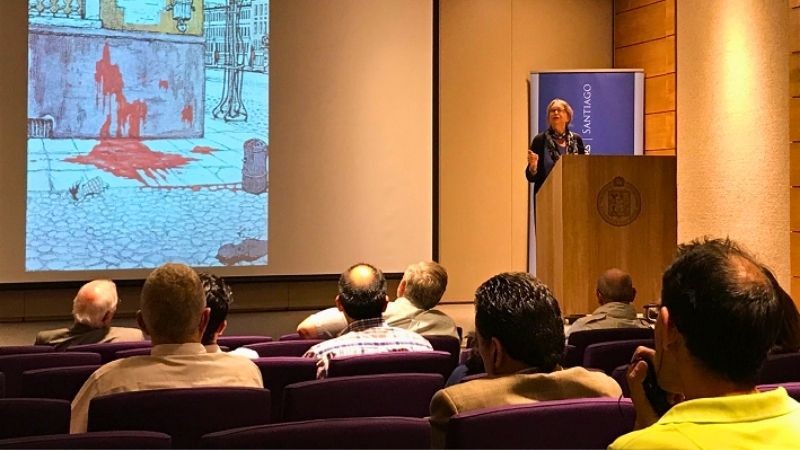Columbia’s Professor of History Catherine Evtuhov Gives Lecture about the "other" Russian Revolution

A different Russian Revolution, occured ten years before 1917, tells us more about Russian politics and society than the one being commemorated in its centenial and is linked to global developments in deeper ways than the latter. This was the argument developed by Columbia’s history professor Catherine Evtuhov in a lecture entitled “Was There a Revolution in 1917? A View from Russia’s Imperial Period”, held in mid- November as the fifth installment of the series on the 100 Years of the Russian Revolution organized by the Santiago Center in conjunction with Univeridad Católica de Valparaíso (PUCV), Universidad Católica de Chile (UC) and Universidad de Chile.
Catherine Evtuhov specializes in the history of Russia, primarily in the imperial period. Her interests include the history of Russian thought in European context, material culture and local history, and the history of the Black Sea region and Russian-Ottoman relations. She taught in the History Department at Georgetown University from 1992 to 2016 and has been visiting professor at several universities. She is the author The Cross & the Sickle: Sergei Bulgakov and the Fate of Russian Religious Philosophy (1997), Portrait of a Russian Province: Economy, Society, and Civilization in Nineteenth-Century Nizhnii Novgorod (2011), and co-author, with Richard Stites, of A History of Russia: Peoples, Legends, Events, Forces – Since 1800 (2003).
According to Evtuhov, the Revolution of 1904-07, which erupted in the wake of war with Japan, brought to a head an acute agrarian crisis with roots in the peasant emancipation in 1861, and mobilized a highly motivated liberal intelligentsia. For three years, Russian society was engulfed in a countrywide crisis that successively brought to the fore a liberal agenda – including a “banquet campaign” like that of 1848 in Paris; violent peasant uprisings and labor unrest; the granting of representative, elected government; radicalization and general strikes that were met by state terror; and finally the first national elections that brought a left-leaning Duma to power. The revolution ended on 3 June 1907, when Prime Minister Petr Stolypin appealed to Article 87 of the Fundamental Laws to dissolve the Second Duma.
Evtuhov explained that throughout the twentieth century, the 1905 Revolution was generally seen as a failure, because it did not remove the autocracy. However, like many “failed” revolutions, it succeeded in recrafting the mechanisms of government, in removing obstacles to freedom of conscience, and in opening the way to intensive economic development. The experience of revolution itself marked a deep change in consciousness.